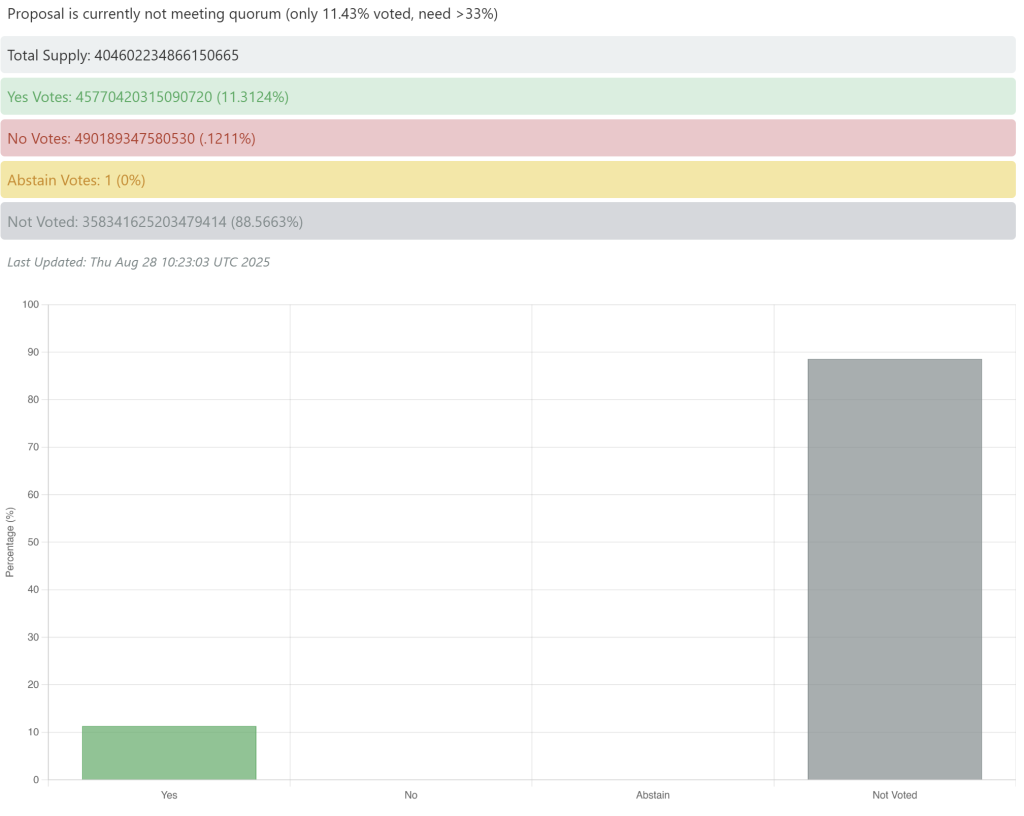Essentially the most formidable consensus overhaul foe Solana up to now—SIMD-0326, nicknamed “Alpenglow”—has formally moved into the group voting window, a three-epoch course of that started firstly of Epoch 840 and can conclude on the finish of Epoch 842.
The proposal rewrites Solana’s core consensus, changing Proof-of-Historical past plus TowerBFT with a contemporary structure centered on a direct-vote finality engine (“Votor”). The authors say Alpenglow considerably reduces latency (from 12.8 seconds below TowerBFT to as little as 100–150 milliseconds) whereas eliminating heavy vote-gossip site visitors by way of off-chain messaging and signature aggregation.
Solana Validators Start Deciding Future Of Alpenglow
Governance mechanics for SIMD-0326 are unusually specific. Vote tokens are claimable by validators based on captured stake weights, utilizing a Merkle distributor instrument; tokens could also be despatched to “Sure,” “No,” or “Abstain” accounts. Passage requires a supermajority: the sum of Sure votes is the same as or larger than 2/3 of the overall sum of Sure + No votes,” with a quorum of 33% wherein abstentions depend towards quorum however not towards the Sure/No denominator.
On day one of many window (Epoch 840), early snapshots present modest—however distinctly optimistic—participation. A number of market information posts report turnout close to 11.5%, with roughly 11.3% of stake signaling “Sure” and negligible “No.” As a result of the overwhelming share of stake has not but solid ballots, this ought to be handled as an preliminary studying quite than a pattern. A public tally dashboard is being maintained by Staking Services.

Alpenglow’s design adjustments transcend pace. The protocol introduces certificate-based notarization and finalization, aggregates validator votes off-chain to scale back overhead, and rebalances incentives round voting. Notably, the proposal replaces per-slot on-chain vote charges with a hard and fast “Validator Admission Ticket” (VAT) at present set at 1.6 SOL per epoch and burned—an financial continuity measure meant to maintain value constructions corresponding to right this moment’s whereas votes transfer off-chain.
“Earlier than every epoch, every validator should pay a hard and fast payment—initially set to 1.6 SOL per epoch,” the authors write, including that the determine mirrors roughly 80% of present on-chain voting prices. Discussion board members have already begun debating whether or not a flat VAT raises entry boundaries for smaller operators, underscoring that the governance dialogue is as a lot about economics as it’s about protocol mechanics.
Timing issues for operators and tokenholders following the vote. Solana epochs are roughly two days in size, so a three-epoch voting window implies about six days from begin to end. The community entered Epoch 840 on August 27, 2025, which locations the anticipated finish of the voting window round September 2, 2025, when Epoch 842 concludes.
If the supermajority threshold is reached, Alpenglow would clear governance, with subsequent activation relying on shopper readiness and the usual Solana launch course of. For now, the main focus is on turnout. With ~90% of stake but to be tallied within the opening snapshot, each validator poll over the approaching epochs will carry outsized weight in figuring out whether or not Solana pursues ~150-millisecond finality as its subsequent consensus horizon.
At press time, SOL traded at $215.

Featured picture created with DALL.E, chart from TradingView.com

Editorial Course of for bitcoinist is centered on delivering completely researched, correct, and unbiased content material. We uphold strict sourcing requirements, and every web page undergoes diligent evaluate by our group of high know-how specialists and seasoned editors. This course of ensures the integrity, relevance, and worth of our content material for our readers.


